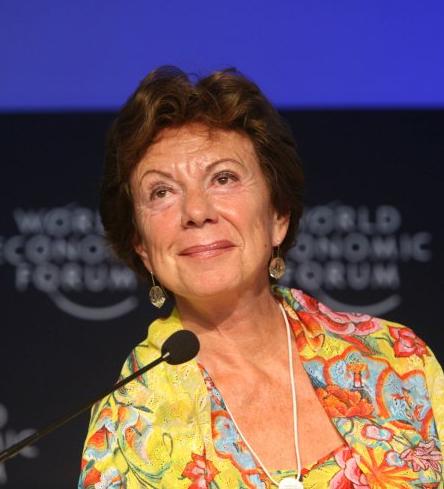

Credit: World Economic Forum
(Creative Commons Attribution-Share Alike 2.0 Generic licence)
On Tuesday May 18th, the Commission's Digital Agenda will be released. This important document will define the European Union's future policies on the Internet and other communications technologies. A leaked draft showed that major policy orientations remained to be arbitrated in advance of the release. Although much of the document puts forward very sensible and positive proposals, potential mentions of dogmatic copyright enforcement and Internet filtering could be sneaked in the final document at the last minute. Will the rights and freedoms of EU citizens be protected?
That last part means that Microsoft could implement an open international standard like ODF if it wanted to, despite being a proprietary software business. So far, it doesn't do so in a way that really works, and the only obstacle I know of, as reflected in their remarks about Google Docs, is a lack of a desire to actually do so.
A year ago, i wrote about how New York City's Summer Youth Employment Program (SYEP) requires the use of Internet Explorer to apply online (and it even appears to require IE just to download the PDF of the application!)
“I would like Kroes to name the corporations that were lobbying behind closed doors for a removal of open standards.”
--Benjamin HenrionA "Digital Agenda Assembly", an annual lobby-parliament to govern the agenda implementation, would be composed of delegates from the European Parliament and industry. The Assembly would bring them together to 'assess progress and emerging challenges' and receive input from a 'High Level Group' and 'stakeholders'.
"Neelie Kroes feeds her ambitious Digital Agenda as raw meat to lobby groups. It is a carrot without stick", warns René Mages from the Foundation for a Free Information Infrastructure (FFII). Mages continues, "The Commissioner undermines the dignity of the European elected representatives by setting them on equal footing with private interest representatives." The FFII fears her governance principles would aggravate the trend to keep the backbone of the European ICT sector, small and medium-sized companies, from having significant influence in Brussels.
"Take open standards for example", comments FFII president Benjamin Henrion. "Earlier drafts of the Commission's Digital Agenda featured 'open standards' but interest groups managed to eliminate the phrase during inter-service consultations. I would like Kroes to name the corporations that were lobbying behind closed doors for a removal of open standards. Brussels should be transparent and be willing to reveal the elephant in the room."
Links
EU Commission Digital Agenda website: The Commission intends to "work closely with national governments, concerned organisations and companies."
http://ec.europa.eu/information_society/digital...
EU Digital Agenda:
http://ec.europa.eu/information_society/digital...
Permanent link to this press release:
http://press.ffii.org/Press%20releases/Neelie...
Contact
Benjamin Henrion
FFII Brussels
+32-484-56 61 09 (mobile)
bhenrion at ffii.org
(French/English)
FFII Berlin
+49-30-41722597
office at ffii.org
(German/English)
About FFII
The FFII is a not-for-profit association active in many European countries, dedicated to the development of information goods for the public benefit, based on copyright, free competition, open standards. More than 1000 members, 3,500 companies and 100,000 supporters have entrusted the FFII to act as their voice in public policy questions concerning exclusion rights (intellectual property) in data processing.